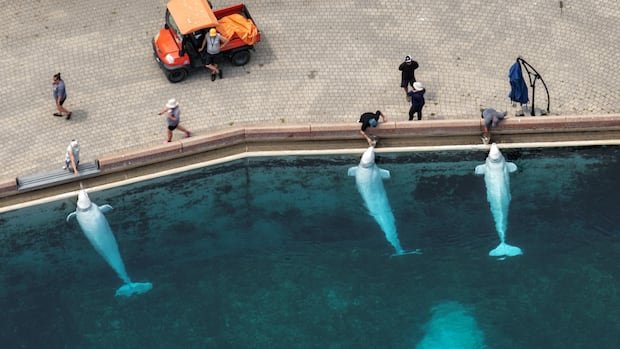Premier Doug Ford of Ontario has pledged to ensure the well-being of the last 30 beluga whales at Marineland by taking all necessary actions. This commitment comes as Marineland in Niagara Falls awaits a decision from Ottawa regarding the potential export of the whales.
During a recent press conference focusing on his initiative to ban speed cameras, Ford addressed the issue of the belugas’ potential export. A federal official familiar with the situation confirmed that Marineland had applied for export permits, emphasizing that the decision would reflect the whales’ health. The Department of Fisheries and Oceans (DFO) clarified that a final decision is pending.
The welfare of the belugas has sparked prolonged debates. Ford reiterated the province’s regular inspections of Marineland, which did not open this season. Expressing empathy for the captive whales, Ford emphasized the importance of finding suitable homes for them if approved by the federal government to ensure a better quality of life.
Since 2019, a total of 19 belugas have perished at Marineland, with the last orca, Kiska, passing away in 2023. The closure of Marineland this year, aside from COVID-19-related shutdowns, has raised concerns about the future of the remaining animals, as the park has begun selling off some of its rides without providing comments.
Ontario Solicitor General Michael Kerzner is set to meet with Fisheries Minister Joanne Thompson to discuss the situation further. Kerzner highlighted the need for timely decisions on export permits, considering the substantial monthly costs associated with feeding the animals.
Meanwhile, Ontario Green Party Leader Mike Schreiner urged collaborative efforts between Ford, marine experts, and Ottawa to devise a plan ensuring the whales’ safety and well-being. Schreiner emphasized the urgency of finding a marine sanctuary for the belugas, given Marineland’s resource limitations and the risks of exploitation.
In a separate development, Chimelong Ocean Kingdom in Zhuhai, China, expressed interest in acquiring the belugas. Some advocates have called for the relocation of the whales and dolphins to a seaside sanctuary, although North America lacks such a facility. Efforts to establish North America’s first coastal refuge for captive whales in Nova Scotia have faced obstacles.
According to Andrew Trites from the University of British Columbia’s Marine Mammal Research Unit, the whales’ health will be a crucial factor in determining their potential relocation, involving thorough assessments of their well-being and fitness for travel.

